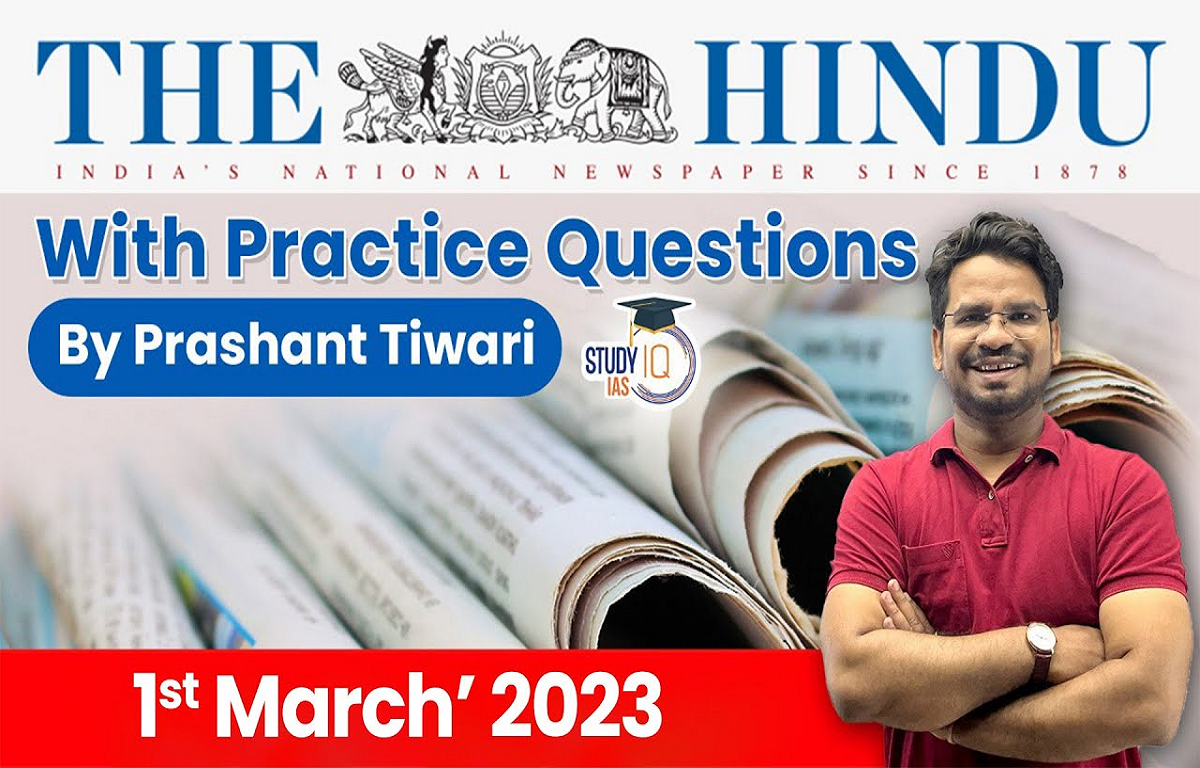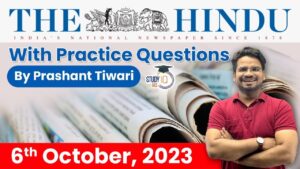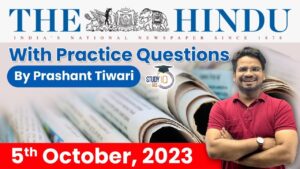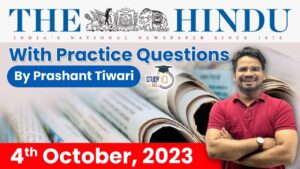The Hindu Newspaper Analysis for UPSC

The Hindu Newspaper Analysis 27 February 2023
- The Supreme Court on Tuesday urged constitutional functionaries to show “mature statesmanship” and not vie with one another in a “race to the bottom” after a war of words between Punjab Chief Minister Bhagwant Mann and Governor Banwarilal Purohit led to an impasse over convening the Budget Session of the Assembly.
- Though the Governor informed the court that the session would be held as scheduled on Friday, a Bench of Chief Justice of India D.Y. Chandrachud and P.S. Narasimha highlighted how rancour and mutual accusations between Governors and Chief Ministers tend to put constitutional values in jeopardy.
- “While the court is cognisant of the importance of free speech and expression, it is necessary to emphasise that dialogue between constitutional functionaries has to be conducted with a sense of decorum and mature statesmanship,” it said.

- Private firms, companies, and public sector units can enter into agreements with the Union Ministry of Culture to adopt and maintain State-owned archaeological sites or monuments. Businesses that enter such agreements are going to be known as Monument Mitras.
- Under the purportedly overhauled ‘Adopt a Heritage’ scheme, businesses may use their Corporate Social Responsibility funds at select sites to construct and maintain ticket offices, restaurants, museums, interpretation centres, toilets, and walkways.
- Another danger of implementing the ‘Adopt a Heritage’ scheme is that it will undermine local communities and their relationships with historical sites.
Adopt a Heritage Project:
- The Scheme was launched on World Tourism Day i.e. 27th September, 2017.
- This project is a key initiative of Ministry of Tourism in close collaboration with Ministry of Culture and Archeological Survey of India (ASI), to develop the heritage sites / monuments and making them tourist-friendly to enhance the tourism potential and their cultural importance in a planned and phased manner.
Who are Monument Mitras?
- Successful bidders selected for adopting heritage sites / monuments by the Oversight and Vision Committee shall be called as Monument Mitras. The basic and advanced amenities of the tourist destinations would be provided by them.
- They would also look after the operations and the maintenance of the amenities. The ‘Monument Mitras’ would associate pride with their CSR activities.

- A group of 16 countries has launched a gallant effort to fight the problem of climate change — an existential threat to human civilisation — at the United Nations (UN). Led by Vanuatu — an island country in the South Pacific Ocean — the group seeks an advisory opinion from the International Court of Justice (ICJ) on the issue of climate change.
- The ICJ has two types of jurisdictions: contentious and advisory. While contentious jurisdiction refers to resolving legal disputes between consenting states, under advisory jurisdiction, the UN General Assembly (UNGA), the Security Council (SC) and other specialised bodies of the organisation can request the ICJ for an opinion on a legal question. Unlike decisions given under the contentious jurisdiction, the ICJ’s advisory opinions are non-binding.
- Small Island Developing (SID) states such as Vanuatu are most vulnerable to rising temperatures and sea levels.
- The Commission of Small Island States on Climate Change and International Law, comprising countries like Antigua and Barbuda and Tuvalu, has sought the advisory opinion of the Hamburg-based International Tribunal for the Law of the Sea (ITLOS).

About ICJ:
- ICJ was established in 1945 by the United Nations charter and started working in April 1946.
- It is the principal judicial organ of the United Nations, situated at the Peace Palace in The Hague (Netherlands).
- Unlike the six principal organs of the United Nations, it is the only one not located in New York (USA).
- It settles legal disputes between States and gives advisory opinions in accordance with international law, on legal questions referred to it by authorized United Nations organs and specialized agencies.
Structure:
- The Court is composed of 15 judges, who are elected for terms of office of nine years by the United Nations General Assembly and the Security Council. These organs vote simultaneously but separately.
- In order to be elected, a candidate must receive an absolute majority of the votes in both bodies.

- Between 2019 and 2021, about 85% of women in Nagaland over the age of 5 had attended school. India’s average was only 72%. Less than 6% of Nagaland women aged 20-24 years, married before turning 18. India’s average was over 23%. Only 29% Nagaland women were anaemic, while India’s average was double that.
- Over 99% of married women in Nagaland participated in key household decisions and only about 6% had experienced spousal violence — about five times lower than India’s figure.
- And yet, in the 14 Assembly elections conducted between 1964 and 2018, Nagaland has not elected even one woman MLA. In this facet, Nagaland is an exception, as it is the only State that is yet to elect a woman MLA.

- Cancer patients in India face twin challenges when it comes to accessing proton beam therapy (PBT): not enough facilities offering the treatment and cost running into many lakhs of rupees.
- The PBT is considered a viable alternative to radiation for treating solid tumours, especially head and neck cancers.
- Unlike radiation which uses X-rays, the PBT uses protons to tackle cancer. While radiation can prove toxic to the whole body, protons can destroy cancer cells precisely by targeting tumours, thus saving adjoining organs.
- “In the U.S., each unit of proton beam therapy serves a population of 7.9 million, while in India there is one unit for 1,412 million people. The ratio is very skewed,”

- In early February, the Ministry of Health pulled up at least twenty companies including Tata-1mg, Flipkart, Apollo, PharmEasy, Amazon and Reliance Netmeds, by issuing them a showcause notice, for selling medicines online.
- E-pharmacies call themselves facilitators of doorstep delivery. They claim tie-ups with retail chemists for vending medicines. However, since profit margins in the drug retail industry are very thin, just about 15% to 16%, every player in the supply chain is struggling to make money.
- Both e-pharmacies and offline retail pharmacists have realised that in a climate where drug delivery is driven by consumer sentiments, it is futile to stick to any one way of doing business.

- Since the end of the Second World War, the global order has seen two major transitions. After the War, a bipolar world, led by the U.S. and the Soviet Union, emerged. Following the disintegration of the Soviet Union in 1991, unipolarity replaced bipolarity, with the U.S. being its centre.
- While many governments, including India, Russia and China, welcome multipolarity, the U.S. remains the world’s most powerful military power. But the U.S.’s ability to shape geopolitical outcomes is clearly in decline, as was seen in its withdrawal from Afghanistan after 20 years of war or the Russian invasion of Ukraine, challenging the post-Cold War security equilibrium in Europe. These changes actually leave the world in a flux.
- There is a convergence of interests between India and the U.S. when it comes to China. The U.S. sees China as a long-term threat to the liberal international order. India sees China as a close competitor whose rise is changing the regional balance of power. So it makes sense for India to build deeper ties with the West, particularly the U.S., in tackling the China challenge. But Russia’s invasion of Ukraine has complicated India’s options further.
- Russia is a traditional partner with which India has deep defence ties. As the West has moved to isolate Russia with heavy sanctions in response to its aggression in Ukraine, India is under huge pressure from its partners to take a more critical position on Russia’s actions. Besides, India also worries that the West’s move to isolate Russia in Europe would push the country further into the Chinese embrace.


 The Hindu Newspaper Analysis 6 October 2...
The Hindu Newspaper Analysis 6 October 2...
 The Hindu Newspaper Analysis 5 October 2...
The Hindu Newspaper Analysis 5 October 2...
 The Hindu Newspaper Analysis 4 October 2...
The Hindu Newspaper Analysis 4 October 2...





















